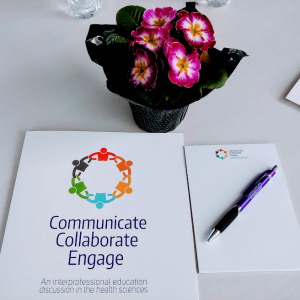Mar
08

Posted by Carolyn Martin on March 8th, 2019
Posted in: Funding, News from Network Members, Training & Education
The following is a guest post by the organizers of the “Communicate Collaborate Engage: An Interprofessional Education Discussion in the Health Sciences” workshop committee.
The term “interprofessional education” (IPE) pops up a lot these days in the health sciences literature. What is it, and how can we best put it into practice?

The University of Washington Health Sciences Library (UW HSL) was awarded a Community Health Outreach grant from the National Network of Libraries of Medicine’s Pacific Northwest Region to put on a one-day conference on interprofessional education in the health sciences. It was timed to coincide with the American Library Association’s (ALA) Midwinter Meeting in Seattle to attract more librarians, but was also open to faculty, staff and students at UW. Over forty people attended, with librarians the majority group. The theme was Communicate Collaborate Engage: An Interprofessional Education Discussion in the Health Sciences, and focused on IPE faculty development and community engagement. The program consisted of three speakers and a panel of community members who have put IPE into practice. Two activities were integrated into the program including Impromptu Networking which was led by UW HSL’s Nikki Dettmar and a project charter activity, led by UW’s Institute of Translational Health Sciences’ (ITHS) Lean Specialist, Jennifer Sprecher.
Maria Wamsley, MD, from the University of California San Francisco (UCSF), spoke on From the Classroom to the Clinic: Meaningful IPE in Workplace Settings. She discussed how UCSF has set up teams in the hospital with a fixed nurse, social worker and pharmacist, in addition to attending physicians, residents, interns and students. There are regular meetings with the team where the benefits have been a greater appreciation of each member’s role and the importance of shared knowledge.
Jennifer Sprecher, ITHS, spoke on the skills which make an effective team, which in turn is what drives an IPE group’s success. Jennifer and Nicole Summerside also spoke on Collaboration and Continuous Learning across the IPE Continuum: Lessons Learned and a Look Ahead. Highlights included that miscommunication coupled with inadequate care coordination, particularly for chronic conditions, has led to unnecessary deaths and problems. IPE helps in the pursuit of the Triple Aim by improving the patient experience of care, improving the health of populations, and reducing the per capita cost of health care.
The community engagement panel included a clinician, a student and a community partner.
The panel was moderated by Tracy Brazg, Assistant Director of the UW’s Center for Health Sciences Interprofessional Education, Research and Practice (CHSIE), the coordinating body of IPE for the UW’s health sciences schools.
A diverse mix of attendees enjoyed lively discussions on what lessons each person could take back to their practice. The assessment/evaluation forms that were turned in were unanimously positive, with people saying they had come out of the program knowing more about IPE, wanting to bring it to their institutions, and also wanting to develop an ongoing community conversation.
The planning committee at UW HSL included Andrea Ball, Nikki Dettmar, and Lynly Beard with fiscal support from Mary Martha McNally and administrative oversight from Emily Patridge.